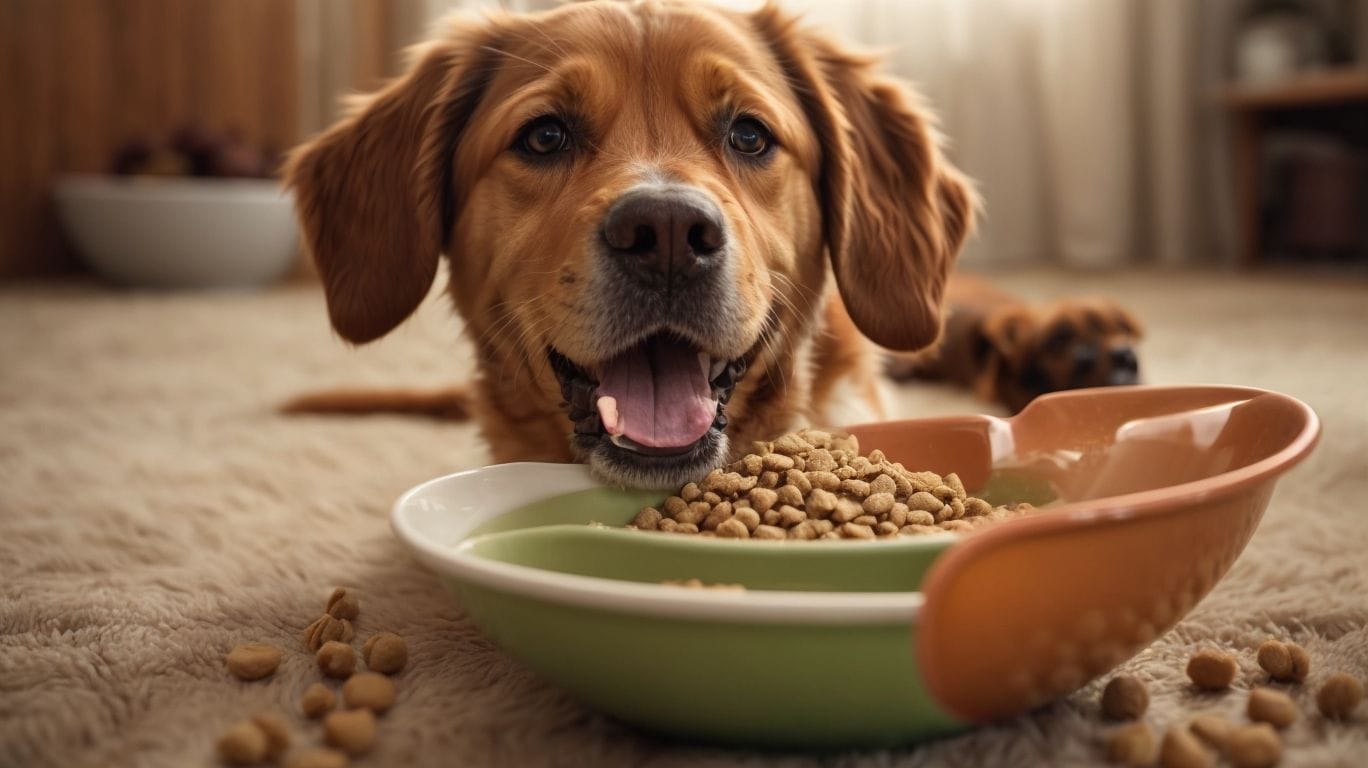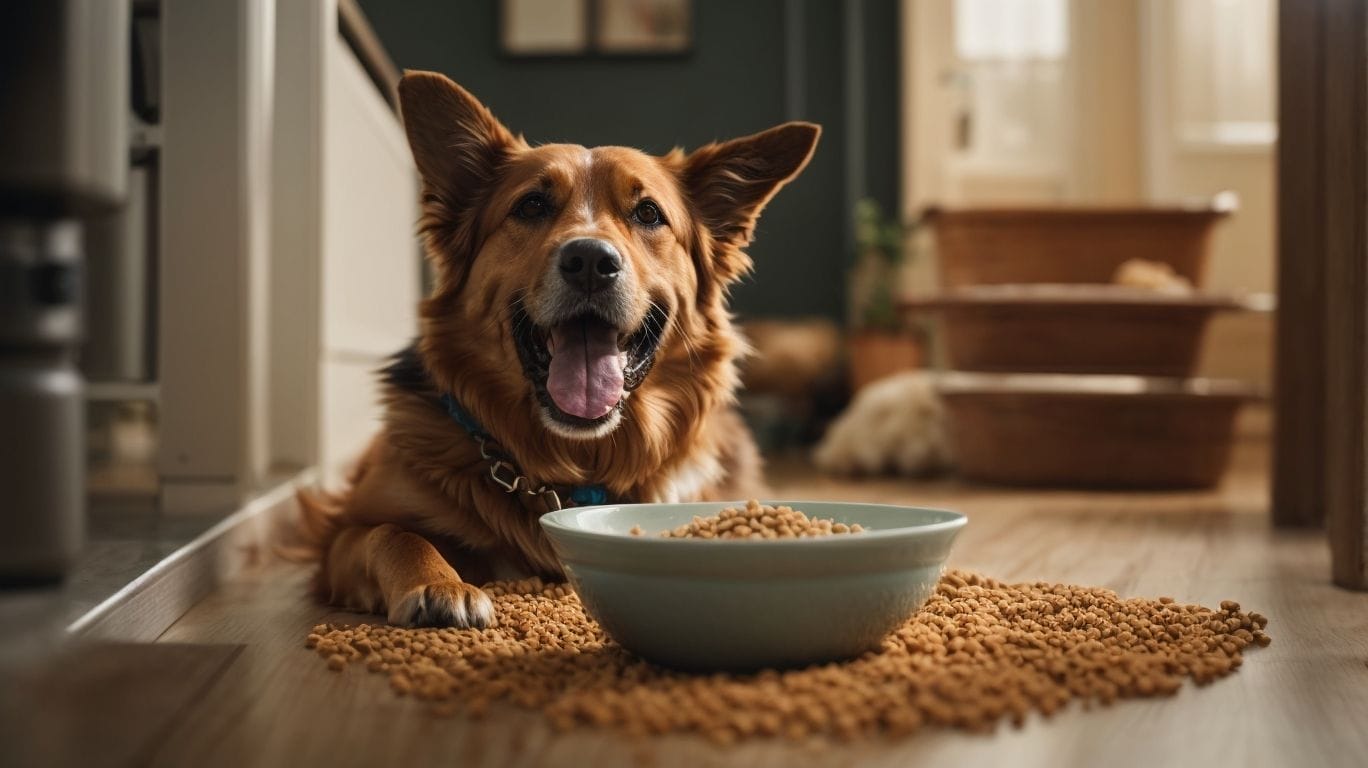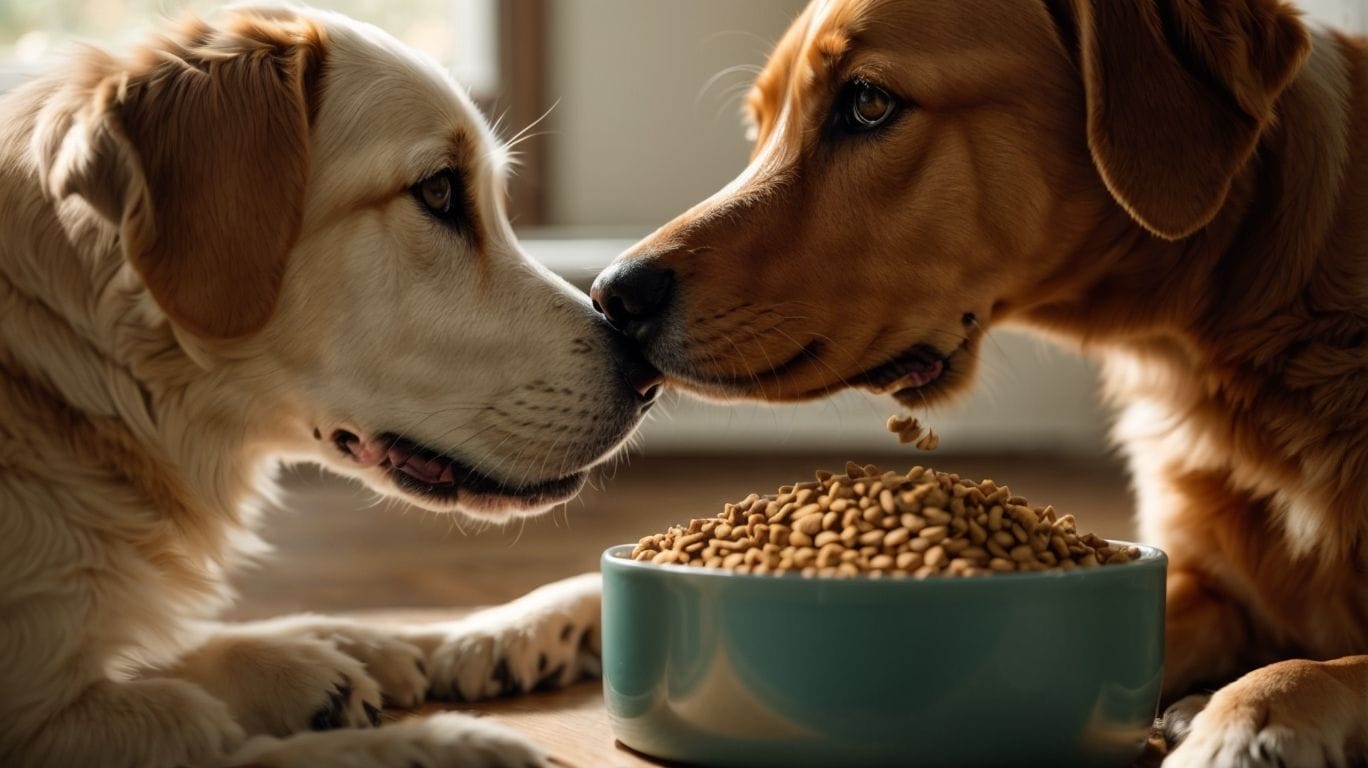Adult dogs and puppies have different nutritional needs, which raises the question of whether adult dogs can eat puppy food. While puppy food is specifically formulated to meet the nutritional requirements of growing puppies, it may not be suitable for adult dogs. It is important to understand the distinctions between puppy food and adult dog food to make an informed decision about feeding your canine companion.
Puppy food is designed to support the rapid growth and development of puppies, providing them with the necessary nutrients for optimal health. It typically has higher levels of protein, fats, and calories to support their energy needs and growth requirements. Puppy food contains specific nutrients like DHA for brain development and calcium for bone growth.
Feeding adult dogs puppy food can pose risks and may lead to health issues. The excess protein, fats, and calories in puppy food can contribute to weight gain and obesity in adult dogs, as their energy needs differ from those of growing puppies. It can also lead to an imbalance in nutrients and potentially cause digestive issues. Certain adult dogs may refuse to eat adult dog food if they become accustomed to the taste and texture of puppy food.
While there may be exceptions, in general, it is not appropriate for adult dogs to eat puppy food. Adult dog food is formulated to meet the nutritional needs of fully grown dogs and balances their energy requirements. It typically has lower levels of protein and fats to support weight maintenance and overall health. However, consult with your veterinarian for specific cases where feeding adult dogs puppy food might be necessary, such as during illness or post-surgery recovery.
If you intend to transition your dog from puppy food to adult dog food, it is important to do so gradually. A recommended transition period is typically around 7-10 days. During this time, gradually mix increasing proportions of adult dog food with decreasing proportions of puppy food. This gradual transition helps your dog adjust to the new diet while minimizing digestive upset. Offering smaller meals more frequently and using positive reinforcement can also ensure a successful transition.
Before making any changes to your dog’s diet, it is essential to consult with your veterinarian. They can provide guidance tailored to your dog’s specific needs and help ensure a healthy and appropriate transition from puppy food to adult dog food.
Key takeaways:
- Adult dogs can eat puppy food in certain circumstances: Puppy food is designed to cater to the specific nutritional needs of growing dogs, so it may not provide the necessary nutrients for adult dogs. However, there are exceptions, such as adult dogs with special dietary needs or health conditions.
- Puppy food differs from adult dog food: Puppy food contains higher levels of specific nutrients like protein and fat to support growth and development. Adult dogs have different nutritional requirements that are better met by adult dog food formulated for their age and size.
- Potential risks of feeding puppy food to adult dogs: Feeding puppy food to adult dogs can lead to excess weight gain, nutrient imbalances, and skeletal issues. It is important to feed adult dogs the appropriate food to maintain their health and well-being.
What is Puppy Food?

Photo Credits: Petnarnia.Com by Logan Harris
Puppy food is specially formulated to meet the nutritional needs of growing puppies. What is Puppy Food? It typically contains higher levels of protein, fat, and calories compared to adult dog food. Puppy food also often includes essential nutrients like DHA, calcium, and phosphorus, which are crucial for proper development. It is important to feed puppies puppy food until they reach adulthood to support their growth and development. As a pro tip, consult with your veterinarian to determine the best puppy food for your specific breed and size of the puppy.
What are the Nutritional Requirements of Puppies?
Puppies have unique nutritional requirements to support their growth and development. What are the Nutritional Requirements of Puppies? They need a diet that is rich in high-quality protein for muscle and tissue development, as well as essential fatty acids for brain development and a healthy coat. Puppies also require a balanced blend of vitamins and minerals to promote proper bone growth and a strong immune system. It’s important to provide puppies with food specially formulated for their needs, such as the Acana Large Breed Puppy Formula, which meets the nutritional requirements set by AAFCO. Consulting a licensed veterinary nutritionist can provide further guidance on meeting the specific nutritional needs of your puppy.
Can Adult Dogs Eat Puppy Food?

Photo Credits: Petnarnia.Com by Alan Davis
Adult dogs should not eat puppy food on a regular basis. Puppy food is specifically formulated to meet the nutritional needs of growing puppies, including higher levels of protein and fat. Feeding adult dogs with puppy food can lead to excessive weight gain and nutritional imbalances. In certain circumstances, adult dogs can eat puppy food temporarily. For example, suppose an adult dog is recovering from surgery or illness. In that case, their veterinarian may recommend feeding them puppy food to provide additional nutrients and calories for a short period. Always consult with a veterinarian before making any changes to your dog’s diet.
Can adult dogs eat puppy food? In 2019, a viral news story emerged about a family who accidentally fed their adult dog puppy food for months. Unaware of the consequences, the dog’s health deteriorated, and he gained excessive weight. After a visit to the veterinarian, the family learned about the potential hazards of feeding adult dogs puppy food. With the guidance of the vet, they transitioned the dog back to an appropriate adult dog diet and implemented a weight-loss plan. The dog made a full recovery, serving as a cautionary tale for pet owners everywhere.
What are the Differences Between Puppy Food and Adult Dog Food?
What are the Differences Between Puppy Food and Adult Dog Food?
When it comes to puppy food versus adult dog food, several key distinctions need to be taken into account. These differences include the nutritional requirements, ingredients, texture, feeding frequency, and transition period.
1. Nutritional requirements: Puppies have specific nutritional needs for growth and development, which means they require higher levels of protein and calories. On the other hand, adult dogs need a balanced diet to maintain their weight and overall health.
2. Ingredients: Puppy food is formulated with higher levels of certain nutrients like calcium and phosphorus to support bone growth. In contrast, adult dog food may contain different protein sources and lower levels of these nutrients.
3. Texture: Puppy food is typically softer and easier to chew for young puppies, while adult dog food tends to have a firmer consistency.
4. Feeding frequency: Puppies usually need more frequent meals throughout the day compared to adult dogs.
5. Transition period: When transitioning from puppy food to adult dog food, it is crucial to make the switch gradually to avoid any digestive upsets.
By understanding these differences, pet owners can ensure that they provide the appropriate nutrition for their dogs at every stage of life.
Why Would an Adult Dog Refuse to Eat Adult Dog Food?
Why Would an Adult Dog Refuse to Eat Adult Dog Food?
Adult dogs may refuse to eat adult dog food for various reasons. One common reason is a lack of variety or taste preference. Some dogs may become bored with the same food every day and refuse to eat. Other dogs may have a sensitive stomach or allergies that make them picky eaters. Dental problems or oral pain can also cause a dog to refuse dry kibble.
In some cases, a dog may be experiencing a health issue, such as gastrointestinal problems or dental disease, which can affect their appetite. It’s essential to assess any changes in behavior or health and consult a veterinarian if necessary. To encourage eating, try offering a different brand or type of food, warming up the food slightly, or adding some low-sodium chicken broth for flavor. Ensuring that the dog is in a calm and comfortable environment during mealtimes can also help.
What are the Risks of Feeding Puppy Food to Adult Dogs?
What are the Risks of Feeding Puppy Food to Adult Dogs?
Feeding puppy food to adult dogs can pose potential risks to their health. Adult dogs have different nutritional needs compared to puppies, and puppy food may not meet those requirements. The main risk is the imbalance of nutrients, such as excessive protein and calories, which can lead to weight gain and obesity. Additionally, puppy food contains higher levels of calcium, which may negatively impact bone development in adult dogs. Extended periods of feeding puppy food to adult dogs can also increase the risk of other health issues like kidney problems. To ensure the optimal health of adult dogs, it is highly recommended to feed them a balanced diet that is specifically formulated for their age and nutritional needs.
When is it Appropriate for Adult Dogs to Eat Puppy Food?

Photo Credits: Petnarnia.Com by Nathan Robinson
When is it Appropriate for Adult Dogs to Eat Puppy Food?
When discussing the topic of feeding adult dogs puppy food, it is crucial to recognize that, in most cases, it is not suitable. Puppy food is exclusively designed to fulfill the nutritional requirements of growing puppies, containing higher levels of protein, fat, and vital nutrients. Adult dogs possess distinct dietary needs, and providing them with puppy food can result in weight gain and nutritional imbalances. Nevertheless, certain exceptions exist, such as in the case of pregnant or nursing dogs or dogs with specific medical conditions. To determine the appropriate timing for adult dogs to consume puppy food, it is always advisable to seek guidance from a veterinarian.
Are There Any Exceptions to Feeding Adult Dogs Puppy Food?
Are There Any Exceptions to Feeding Adult Dogs Puppy Food?
While adult dogs typically should not eat puppy food, there are some exceptions to this rule. Certain circumstances may warrant feeding adult dogs puppy food temporarily, such as during a transition period from puppy food to adult dog food. Adult dogs with specific health issues or dietary needs may benefit from being fed a puppy formula. It is crucial to consult with a licensed veterinary nutritionist to ensure the appropriate nutritional balance and avoid any potential negative impacts. It is always best to prioritize a dog’s individual needs and make informed decisions based on professional guidance.
In the early 2000s, a research study found that feeding large-breed puppies diets with high protein and energy levels contributed to bone and joint problems. This led to a change in understanding of the importance of properly balanced nutrition for growing dogs. The Association of American Feed Control Officials (AAFCO) established nutrient profiles for puppy food, and manufacturers began producing formulas specifically designed for different life stages. This shift in the understanding of puppy nutrition has helped prevent many preventable diseases and improved the overall well-being of dogs.
How do you transition a dog from puppy food to adult dog food?

Photo Credits: Petnarnia.Com by Robert Sanchez
How do you transition a dog from puppy food to adult dog food?
Transitioning a dog from puppy food to adult dog food should be done gradually to avoid digestive upset. Follow these steps:
- Please consult your veterinarian: Get their recommendation based on your dog’s breed, size, and activity level.
- Slowly mix in adult food: Start by mixing a small amount of adult food with your dog’s current puppy food.
- Gradually increase adult food: Over a week or two, gradually increase the proportion of adult food.
- Monitor your dog: Watch for any signs of digestive upset or allergies during the transition.
In ancient Rome, dogs were primarily fed a diet of bread, cheese, and raw meat, with occasional servings of vegetables and fruits. The transition from puppy food to adult dog food was likely not a concern as dogs were fed similar diets throughout their lives.
What is the Recommended Transition Period?
What is the Recommended Transition Period?
When transitioning a dog from puppy food to adult dog food, it is recommended to do so gradually over 7-10 days, which is the recommended transition period. This allows the dog’s digestive system to adjust to the new food without causing any gastrointestinal upset. Start by mixing a small amount of the adult dog food with the puppy food and gradually increase the ratio of adult food to puppy food each day. Monitor your dog’s appetite, energy levels, and bowel movements during the transition period to ensure a smooth adjustment. It’s important to remember that every dog is different, so the recommended transition period may vary depending on your dog’s individual needs and sensitivities.
Pro-tip: If your dog experiences any digestive issues during the recommended transition period, consult with a licensed veterinary nutritionist for personalized guidance.
What are Some Tips for a Successful Transition?
To successfully transition a dog from puppy food to adult dog food, here are some tips:
Gradual transition: Mix increasing amounts of adult food with decreasing amounts of puppy food over 7-10 days.
Monitor digestion: Watch for any digestive upset or changes in your dog’s bathroom needs during the transition.
Stick to the same brand: Choose an adult dog food from the same brand as the puppy food to maintain consistency in flavors and textures.
Consult a professional: If you have concerns or specific dietary needs for your dog, consult a licensed veterinary nutritionist for tailored advice.
By following these tips, you can ensure a smooth and successful transition to adult dog food for your furry companion.
Some Facts About Can Adult Dogs Eat Puppy Food:
- ✅ Adult dogs and puppies have different dietary needs. Puppies require higher calorie intake for growth and development. (Source: Our Team)
- ✅ Puppy food is more calorie-dense than adult dog food. The extra calories in puppy food come from healthy proteins and fats. (Source: Our Team)
- ✅ Feeding adult dogs puppy food can lead to unwanted weight gain and obesity. Puppy food contains essential nutrients needed for proper growth and development but can cause health issues in adult dogs. (Source: Our Team)
- ✅ Puppy food can be temporarily fed to adult dogs under special circumstances. This includes situations such as pregnancy/weaning, underweight dogs, and high-energy breeds. (Source: Our Team)
- ✅ Feeding puppy food to adult dogs full-time is not recommended. It’s like feeding junk food to adult dogs and can have a negative impact on their health. Consult with a vet for recommendations. (Source: Our Team)


